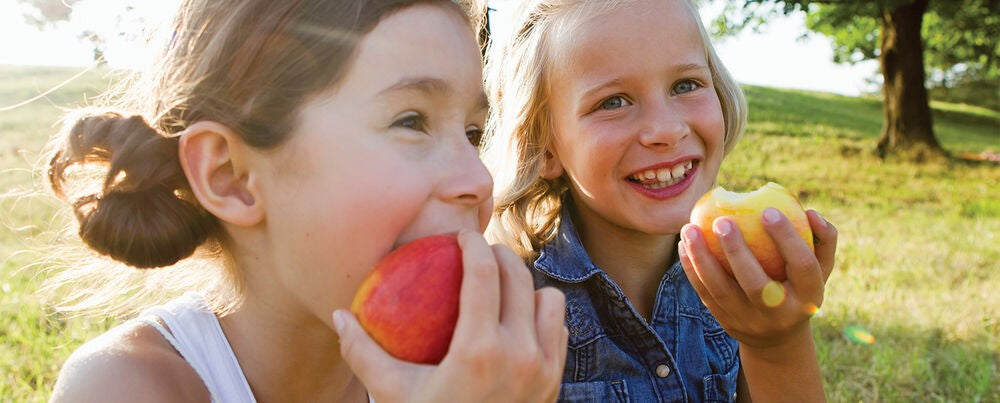
The Importance of a Balanced Diet in Children’s Growth & Development
share
The early years of life involves not only a period of rapid physical growth but also significant cognitive and behavioural development. Bones, muscles and organs, not to mention hair, skin, nails and brain matter, all need a constant stream of nutrients to function. A healthy, balanced diet is essential to provide these necessary nutrients to facilitate this growth and development, not only in the early stages of life but also to ensure resilience into the future.
Behaviour surrounding food and eating habits begins early in life and evolves as children grow. Outside influences including the eating habits of family and friends can strongly impact the choices children will make around food as they go on to develop their own habits and preferences, potentially setting the stage for lifelong habits. Bad habits established early can be hard to shift later in life.
Providing children healthy food and encouraging good dietary habits early on is a gift which will continue on giving well into their adult years, potentially lowering their risk factor for chronic health issues as they age. Starting life with healthy food sets your body on the right path, health wise. Good food builds healthy, strong bodies which are more resilient towards future health problems.
Babies are born with an innate preference for sweet foods and an aversion to bitter tasting foods, this is thought to be an evolutionary way of attracting us to foods high in energy producing sugars and directing us away from unpleasant tasting and potentially harmful substances like poisons. This is often thought to be why most children prefer the sweet taste of fruit rather than the bitter taste of leafy greens.
Some young children may need some encouragement when it comes to eating a healthy diet. Children don’t begin life with a taste for salty, unhealthy foods, it’s an acquired taste, so it’s best to try and steer clear of these kinds of foods and encourage children to enjoy the natural flavours of foods for as long as possible.
It’s not always just the type of food that we need to keep an eye on, but also the portion size which can tend to increase if we are not mindful. Try to keep to appropriate portion sizes, don’t let children mindlessly eat out of a packet. Place the food in a bowl so they are able to get a good sense of what a healthy portion looks like. Perhaps have a fruit bowl within reach or healthy snacks like cut up fruit and vegetable sticks in the fridge for quick, easy snacks.
Fussy Eaters
Once they reach school age, children start to become more aware of the eating habits of others around them. This may not always prove to be a positive influence, so it is important to educate children early as to why it is important to make those healthy food choices in the first place. Children who understand more about how food affects our body may be more inclined to make better choices. Perhaps ask older children to read out the ingredients on food labels so they become more aware of hidden nasties and additives. Younger children may be better suited to help out with selecting fruit and vegetables at the grocery store, or organise a trip to a local farm and pick your own fruit. Don’t forget that often parents are often the best role models, so make sure that you practice what you preach and lead by example.
Children who are constantly exposed to a variety of healthy options may tend to be less fussy and more willing to try new foods. Eating away from home, such as at school camp or dinner at a friend’s house can be quite stressful for children who are less adventurous or have limited food preferences.
While eating a variety of food is ideal, fussy eaters may tend to favour one or two foods or drinks and tend to stick to these. Pasta or milk are often popular and children may fill up on these and claim to be too full for anything else. Gently encourage a new food item each meal, but try not to make a fuss. Make every bite count by making meals nutrient dense. Try adding avocado to a wrap or toast, cheese or hummus to a sandwich or perhaps a pasta sauce made with pureed vegetables.
The number of people who follow a plant based diet is on the rise. Carefully balanced plant based diets can be suitable for all ages, however when it comes to children, careful planning and preparation is of the utmost importance to ensure that all their nutritional requirements are met. Vitamins and minerals are important, but so are macro nutrients such as protein which are needed for growth. A diet with a variety of fruit, vegetables, nuts, seeds and tofu will provide all the nutrients that a child needs, however a paediatric dietitian will be in the best position to offer advice best suited to your child and their individual circumstances.
Kids in the kitchen
These days, it seems as though we never have enough hours in a day and takeaway for dinner can often feel like an easy option at the end of a long day. Home cooked meals don’t need to be complicated and stressful, try to find healthy, child friendly recipes that the whole family can enjoy or perhaps get creative and try to sneak some grated veggies into the family’s favourite recipes. Finely chopped mushrooms, grated carrot or zucchini can be added to spaghetti bolognaise, they’ll never know it’s there. Homemade food is generally best as you know exactly what goes into making it, plus it makes life a lot easier when it comes to catering to personal tastes and keeping the whole family happy.
Kids often love to help out, so try to allocate age appropriate jobs if you have a child who is eager to help. Cutting mushrooms with a child friendly knife or whisking eggs may be suitable jobs for little hands or simply helping to wash the vegetables can help children explore new colours and shapes and perhaps spark their interest and curiosity.
If you have a vegetable garden, try to get the kids involved. Perhaps they can help to pick out which vegetables they would like to grow. Give them their own little basket and let them pick the produce for themselves. If you don’t have the space for a vegetable garden, try growing herbs in a pot or colourful container and check your local nurseries for varieties which have been specially propagated for pots and smaller areas.
The early years of life involves not only a period of rapid physical growth but also significant cognitive and behavioural development. Bones, muscles and organs, not to mention hair, skin, nails and brain matter, all need a constant stream of nutrients to function. A healthy, balanced diet is essential to provide these necessary nutrients to facilitate this growth and development, not only in the early stages of life but also to ensure resilience into the future.
Behaviour surrounding food and eating habits begins early in life and evolves as children grow. Outside influences including the eating habits of family and friends can strongly impact the choices children will make around food as they go on to develop their own habits and preferences, potentially setting the stage for lifelong habits. Bad habits established early can be hard to shift later in life.
Providing children healthy food and encouraging good dietary habits early on is a gift which will continue on giving well into their adult years, potentially lowering their risk factor for chronic health issues as they age. Starting life with healthy food sets your body on the right path, health wise. Good food builds healthy, strong bodies which are more resilient towards future health problems.
Babies are born with an innate preference for sweet foods and an aversion to bitter tasting foods, this is thought to be an evolutionary way of attracting us to foods high in energy producing sugars and directing us away from unpleasant tasting and potentially harmful substances like poisons. This is often thought to be why most children prefer the sweet taste of fruit rather than the bitter taste of leafy greens.
Some young children may need some encouragement when it comes to eating a healthy diet. Children don’t begin life with a taste for salty, unhealthy foods, it’s an acquired taste, so it’s best to try and steer clear of these kinds of foods and encourage children to enjoy the natural flavours of foods for as long as possible.
It’s not always just the type of food that we need to keep an eye on, but also the portion size which can tend to increase if we are not mindful. Try to keep to appropriate portion sizes, don’t let children mindlessly eat out of a packet. Place the food in a bowl so they are able to get a good sense of what a healthy portion looks like. Perhaps have a fruit bowl within reach or healthy snacks like cut up fruit and vegetable sticks in the fridge for quick, easy snacks.
share
Stay Informed. Feel Your Best.
Get expert tips and actionable health advice. Be the first to hear about Caruso's product launches and receive exclusive promotional offers.
Join our newsletter today.



